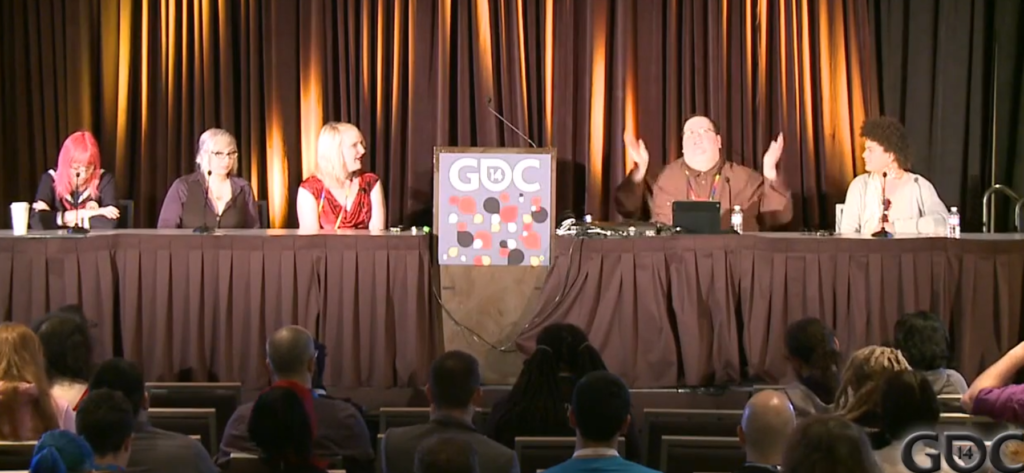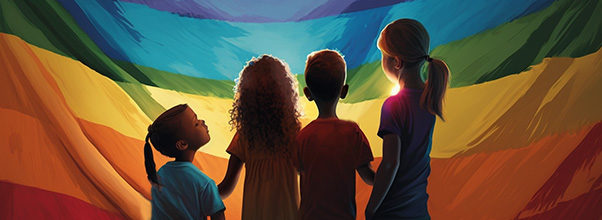By now most American gamers have seen the black ESRB warning labels on the covers of video game software boxes. The Entertainment Software Rating Board is a private organization run and controlled by major studios in the video game industry. The goal of the ESRB is to rate entertainment software with the purpose of determining its suitability for various age groups from children to teens and beyond. Their target audience are parents who represent a significant part of those who purchase video games.
The ESRB was formed to self-police the industry so that the government would not have to get involved and impose even stricter warning labels.
Back in the last century, both the comic book industry and the motion picture industry wisely created similar self-policing organizations like the Comic Code and MPAA rating boards. Like the ESRB, both organizations were created with the intent of being proactive to stave off government regulators.

If we look closely at the actual ESRB video game ratings, we see that they strive to warn parents of every possible unpleasant and potentially inappropriate thing that happens in videos that their children and teens may be exposed to. This effort by the ESRB is worthwhile and admirable.
However, the ESRB has not been without its critics over the years. As video game studios seek to increase their revenue, the ESRB failed to warn parents and gamers about the pernicious in-game mechanic of loot boxes. Loot boxes are a form of gambling. Eventually, the ESRB succumbed to public pressure and now includes a warning about loot boxes and in-game purchases:

Another problem with the ESRB is that they allegedly do not bother to play the games they rate. Apparently, all they do is watch a trailer from the studio and publish the rating.
It’s important to point out that the ESRB is not an independent, non-partial, or objective organization. They are an organization controlled and funded by the powerful video game industry that has its own cultural and political agenda. And, as a result, they do their bidding.
While the ESRB does warn parents and gamers about sexualized content in video games, one wonders why there are currently no warnings about LGBTQ content and queer propaganda in video games.
Why is this important?
Parents who are raising their children with traditional family faith values have a right to know if inappropriate content such as sexual degeneracy or non-traditional sex roles is included in the video games that their children and teens play. If actual or implied nudity, fornication, transgenderism, BDSM and fetish behavior, group sex, oral sex, and sodomy are included in video games, parents have the right to know this before they purchase.
According to Wikipedia, the number of video games that include LGBTQ content is increasing every year. Examples of this content are the inclusion of transgender, pansexual, gay, lesbian, bi-sexual, queer, and non-binary characters that engage in all kinds of non-traditional sexual relationships.
Example 1: Hades
For example, the ESRB rated a video game called Hades and gave it a TEEN rating:

Their rating and review of Hades include no reference to the bisexual and pansexual sexual proclivities of the playable protagonist Zagreus.
Here’s the ESRB’s full review of Hades:
This is an action/role-playing game in which players assume the role of Zagreus, the son of Hades, as he attempts to escape the underworld. From a pulled-back ¾ perspective, players battle their way through dungeons filled with mythological enemies (e.g., giant rats, furies, gods). In addition to melee weapons such as swords and hammers, players can acquire magical powers associated with the major Greek gods/goddesses. Combat is frenetic, with frequent explosions, impact sounds, and light effects. Some attacks produce small splatters of blood, and game environments depict blood streaks/stains. The game contains some suggestive material: a character portrait depicting a goddess with long strands of hair covering her breasts and groin; an implied sex scene in which the screen turns black as giggling and whipping sounds are heard. During the course of the game, the god of wine, Dionysus, appears with a chalice of wine; his attack moves contain references to alcohol (e.g., “Drunken Flourish,” “Curse of Nausea,” “Premium Vintage”). The word “bastard” appears in the dialogue.
Here’s what Wikipedia has to say about the LGBTQ content in the game:
Zagreus, the rebellious child of Hades, was described by the game’s writer and designer Greg Kasavin to be “bisexual or pansexual” to fit with the game’s Greek setting. He has a few romance options including the god of death Thanatos, and Megaera of the Fury Sisters, which he can pursue independently or romance at the same time, beginning a polyamorous relationship. In the game, Zagreus also seems to briefly flirt with Achilles once.
It’s very obvious that the ESRB rating for Hades is focused mostly on violence, barely acknowledges the sexual content, and blatantly ignores the LGBTQ content found within. This is a glaring omission that serves to deceive parents who have no idea about the nature of the sexual content in the game.
Example 2: Tell Me Why
A more egregious example of LGBTQ indoctrination being ignored within a video game by the ESRB is Tell Me Why by developers Dontnod published by Microsoft for the Xbox. From Wikipedia:
The developer went as far as to collaborate with GLAAD — one of the major LGBTQ activist groups — to create the protagonist Tyler who is transgender. According to Wikipedia,
Here’s the ESRB’s whitewashed review of the game:

This is an adventure game in which players follow the story of twin siblings as they uncover the secrets of a hidden past. Players use special powers to navigate through physical and logical puzzles, while making dialogue and action choices that influence their progression. One dramatic sequence depicts a character stabbed in the back; blood is seen on another character’s hands. The dialogue contains a reference to drugs (e.g., “Didn’t Tessa bust Dan for smoking weed behind the store once?”). The words “f**k” and “sh*t” are heard in the game.
Notice there is no mention of the fact that Tyler is a biological male who identifies as a female. Nor is there any mention that he can have a romantic relationship with a PC called Michael. The ESRB has purposed omitted these key facts and as a result, is purposely deceiving parents and others about the LGBTQ content within the game.
Here’s Wikipedia’s take:
Tyler and his twin sister Alyson travel to their childhood home in Alaska and must come to terms with their childhood. The game will also deal with how Tyler, who has transitioned since leaving home, is being affected. Dontnod worked with GLAAD to help create the character. Tyler can potentially start a relationship with Alyson’s best friend Michael.
Imagine the social media outrage that would ensue if a video game studio worked directly with the Family Research Council to create characters for a video game for the purposes of spreading Christianity and traditional marriage within a video game.
Is Viewing Violence More Traumatizing than Viewing Degenerate Sex?
Children and teens are traumatized more by viewing sexual content than they are by viewing violent content. Ask the many children who have been molested and raped by adults about the traumatization that affected their entire lives. Yet, you never hear about people who were traumatized by gratuitous violence in The Three Stooges films or classic TV cartoons.
Garbage In, Garbage Out
As the video game industry becomes more woke and as the industry openly hires and celebrates LGBTQ people, the content within video games reflects that. The level of LGBTQ content seeping into games is directly proportional to the number of LGBTQ people working in the industry. Not content to simply work in the video game industry, many alphabet people see themselves as “queer” activists and purposely use the medium as a vehicle to evangelize identity politics, normalize their sexual degeneracy, and culturally groom children and teens.
We have direct evidence of this from a Game Developers Conference (GDC) panel titled How to Subversively Queer Your Video Game.

This particular GDC panel was rife with obnoxious people that would be more at home at a carnival sideshow than in the video game industry. None of these “experts” has ever accomplished anything of substantive value in the video game industry, yet they all felt compelled to urge the video game industry to sneak so-called “queer” propaganda into video games.
Other than Zoe Quinn — a chronic attention seeker infamous for her involvement in the GamerGate scandal back in 2014 — there are no other noteworthy persons in attendance except a “queer” activist named Todd Harper who is currently an associate professor teaching at the University of Baltimore.

Openly gay Todd Harper rose to 15 minutes of fame by ambushing an unsuspecting Rob Pardo at an MIT talk with questions about a lack of diversity and LGBTQ representation in Blizzard games. Pardo was at that time a VP of Blizzard for their World of Warcraft MMO franchise. Soon after, under Mike Morhaime’s leadership, Blizzard embarked on a journey of wokeness and Pardo departed Blizzard thereafter.
To its eternal shame, the GDC has become more virulently woke over the years and routinely promotes the inclusion of sexual degeneracy and identity politics within video games.
Conclusion
I can only speculate why the ESRB has failed to warn parents and the public about LGBTQ content and propaganda. My theory is that the ESRB reflects the political and cultural beliefs of the big studios that own them and the staff that works for them. Big tech and big entertainment are the biggest corporate advocates of wokeness, identity politics, cultural Marxism, and the LGBTQ agenda; the ESRB would never dare to oppose them by putting LGBTQ warnings on video games. To do so would anger the alphabet people who thanks to diversity hiring, are probably over-represented in the video game industry.
The values of the big tech and big entertainment who own the ESRB do not align with the values of all Americans, especially Christians, Jews, Muslims, and other people of faith. Despite this, they continue to impose their woke metropolitan Silicon Valley values on all Americans.
Clearly, the ESRB is putting the idealogy of their owners and staff ahead of the well-being of parents and non-parents who purchase video games.
But it’s not just about children. As an adult, I have the right to make an informed choice about what I purchase for my own use. I have the right to know if people who hate me and hate what I believe are putting in subversive content with the purpose of insulting me, indoctrinating me, or normalizing their sexual degeneracy. As a consumer, I have a right to know if there is political and cultural propaganda in the entertainment I buy.
By their deceit and negligence, the ESRB has abdicated its original purpose and is failing adults, parents, and children by not including warnings about LGBTQ content in video games.
As we have seen with the release of the Twitter files, we now know that corporate America cannot be trusted to self-regulate and self-police itself.
Given how the big tech and big entertainment have been relentlessly promoting the degenerate LGBTQ agenda, environmental catastrophism, divisive critical race theory, race-swapping, and gender-swapping in their products, I believe that the United States Congress should now get involved and demand accountability from video game studios.
–Wolfshead
Update
I found some additional information that sheds more light on the ESRB’s refusal to mention LGBTQ sexual content. In 2014, Gamedeveloper website asked the ESRB what their policy on this was and this is their response:
“ESRB’s ratings criteria do not distinguish between heterosexual and same-sex content when it comes to addressing sexuality in games.”
This is a shameful copout. Homosexual sex is unnatural and a violation of natural law. It has no purpose but pleasure. Sexual intercourse by a married man and woman is both procreative and unitive. I find it hypocritical that the ESRB can make value judgments on what level of violence is appropriate for children and teens, but is unable to make judgments between marital sex, fornication, and LGBTQ degeneracy. For all intents and purposes, the ESRB is a useless and corrupt organization that is more interested in not offending the alphabet people than providing parents with accurate rating information to help them in their parenting.






Oh my, this GDC panel. One would not think this is even possible. Regarding HADES, I got it by recommendation and found it repetitive as eff. Gave it up very quickly, too late to refund, got it on Epic Megastore as it was on sale and very cheap (in hindsight, make it free or cheap and praise it, best way to make kids consume this poison…). But ratings for the game were full of praise only. It got massively overrated, there were critical views that were totally washed away by a flood of 10/10s. But I noticed nobody I knew but the people I knew to be extremely in Manga/Anime and left leaning liked it or even bothered to think about it.
I didn’t get to the subversive parts and perversions of the game, but art style, tone… let me say it felt a bit weird. The same kind of creepy weird I get with most things I know about James Gunn, his weirdness, to put it politely, and its influence of his movies.
I think this game was pushed by a network of activists. Maybe that was one of the recommendations of the panel. And we know how easily games reviewers can be bought if they are not already on board of the woke train.
Bad times. Games, literature, movies…
Going slightly OT: Western Europe is going down hard. Try to save yourself and your family. America is still fighting its culture war, the poison spread to Europe very successfully, unfortunately.